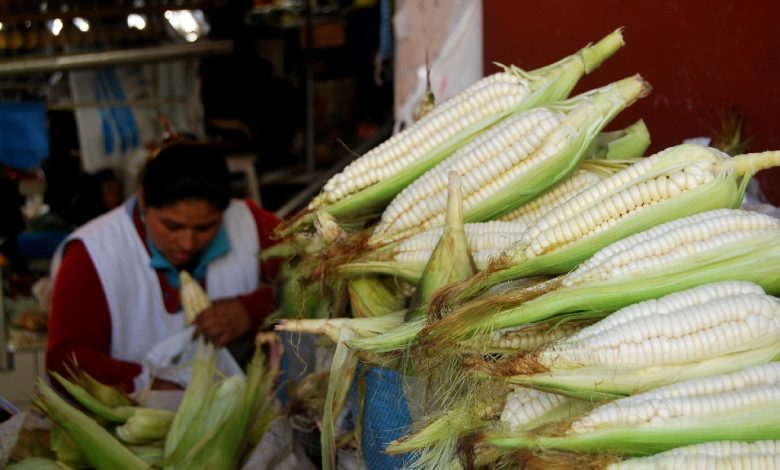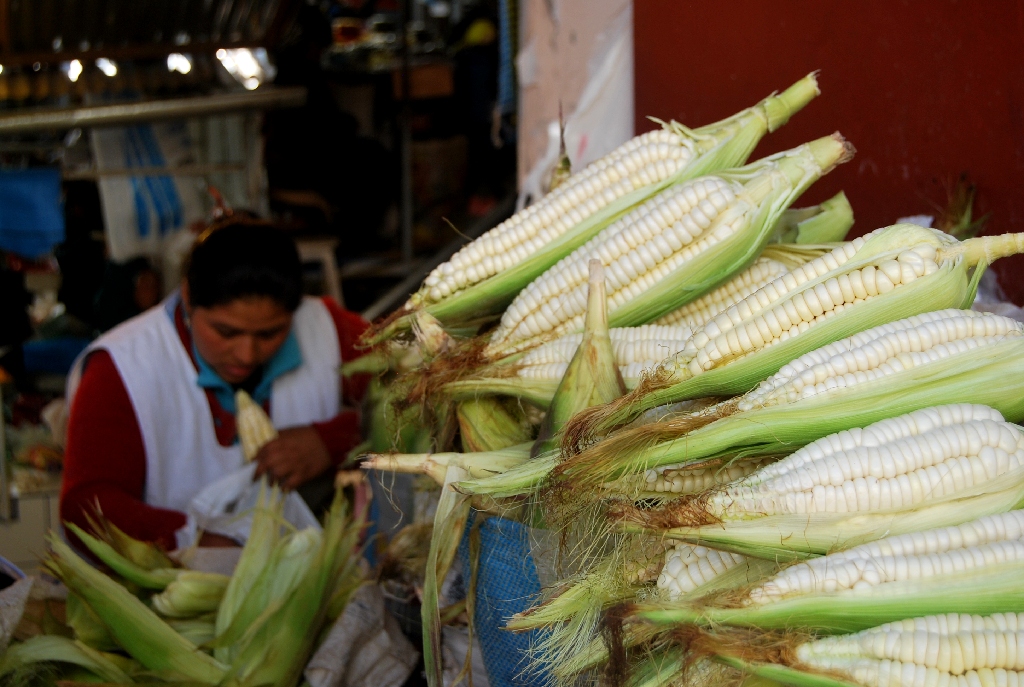Conversation Ensues: The Fate of Giant White Corn

Fresh Corn from the Sacred Valley (Walter Coraza Morveli)
Sometimes you get in a taxi and silence ensues, mitigated only by the sounds of traffic, the radio, or music. Other times you get in and, as if by magic, a conversation ensues. I do not know about anyone else, but I almost always find these spontaneous discussions thought provoking and I always seem to learn something.
This morning, as I left the house here in Cusco, a taxi hailed me.
All the roads are torn up from utility work in my neighborhood. Instead of being repaved, the excavations have been left uncovered though filled with dirt. With the rains, they have become mud puddles and you often cannot tell water how deep the holes really are when driving through the sheet of thick, brown muddy water. They just look brown, glisten in whatever light there is while they have hidden shadows.

It is also bad when you are walking. You do not want to coat your shoes and clothes with mud as the day begins. As a result, I was excited when the taxi tapped his horn after I had just barely taken a few steps along the sidewalk and was debating where best to attempt to cross the potentially deep mud.
Once in the taxi, the mud and the failure of the government to pave the streets again started a conversation going. The driver explained that by delaying the work the government could generate a larger budget for itself and its employees. This is just one of many explanations running through the neighborhood like wildfires.

Then he asked where I was from, commented on my Spanish, and asked how long I had been in Peru. Once I had answered him it was my turn.
“Are you from Cusco?”
“No, I am from Urubamba, a town in the Sacred Valley?”
“Oh, I know Urubamba. It is beautiful there.”
“Yes, but there is lots of change and people are leaving. With the construction of the new airport in Chinchero, land is being bought up for building lots of hotels since the new city will be there. Tourists will no longer come to the City of Cusco. They will just go there straight from the airport. After all, they just come to see Machu Picchu and it is a shorter distance away from Urubamba than from Cusco. The Sacred Valley will be the new city.”
“I heard Chilean capital was buying up lots of land there.”
“Yes they are. They are buying up all the corn fields.”
“What will happen then to the giant white corn of Cusco which only grows there?”
“There will be no more of it.”
And with that it seemed the air closed in, the clouds darkened, and heavy storms surrounded. The white corn of Cusco has been given a Designation of Origin by the Peruvian government and it has been officially recognized as Cultural Heritage of Peru.
Now it would be no more, because the land on which it grows is more valuable for hotels and suburbs. Economic cost benefit, the iron law of accounting, would overwhelm other values like culture, heritage, and symbols.
Maybe it can grow somewhere else, but things would not be the same. It also would not retain the denomination of origin for which so many people worked so hard.
The driver told about people who were tired of farming and wanted money for a “good life”, a life in the city with consumer goods and trips. The money was enticing to them and since the corn was raised by small to medium farmers, without some other protection, the land was quickly being snapped up, he said, for development.

Small farmers, without a regulatory regime protecting them and their agriculture, were the achilles heel of the goal to promote Peru by recognizing its unique foods.
I do not know if the taxi driver is right or if his predictions of the future will come true. After all construction on the new airport has not even begun.
Nevertheless, he points to something in the background of the current presidential elections in the country. That is a neoliberal system in which only economic rationality, the rule of calculations on a spread sheet, has value.
The traditional squiggles and operations that make up math, in the context of rules that give it priority and deny things that are not countable, such as a food—giant white corn—a traditional place, the Sacred Valley of the Incas, and a cultural attempt to respond and bring weight—denomination and declarations of heritage, just do not matter in the face of potential development and profits from investments.
Though many Peruvians are troubled by the rule of economic rationality and neoliberalism, few of the candidates articulate publicly an argument against it, even if many economists are aware of the importance of regulatory regimes, and other sources of key value than simply monetary calculation. Many are aware of the little theatre that neoliberal treaties create hereby all that can be set aside and only certain monetary calculations—profit—can be the point of a country’s life.
Giant white corn, I hope your end is not approaching. You are wonderful. You are filled with symbolism and government support. All that will not be enough, if my driver is right.





